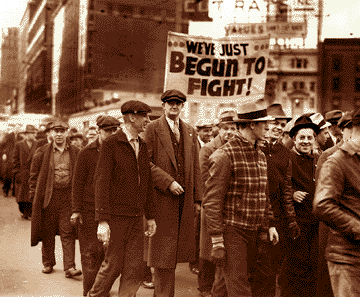Submitted by Anne Landman on
 It is both ironic and symbolic that Wisconsin's governor is the most visible one leading the way to dismantle workers' rights in the U.S. Wisconsin has been a pioneer in achieving workers's right in America, making Governor Scott Walker's efforts in this state particularly poignant.
It is both ironic and symbolic that Wisconsin's governor is the most visible one leading the way to dismantle workers' rights in the U.S. Wisconsin has been a pioneer in achieving workers's right in America, making Governor Scott Walker's efforts in this state particularly poignant.
In 1959, Wisconsin became the first state in the union to guarantee collective bargaining rights for public employees by enacting a law that protects municipal workers from being fired or otherwise discriminated against for engaging in union-related activities. That law was further strengthened in 1963 to give either the union or the employer the right to call in a "fact finder" to help resolve bargaining disputes. In 1965, Wisconsin's state employees won a limited right to bargain collectively, and those rights were further broadened over the next six years.
Wisconsin also blazed the trail in other key workplace protections that many workers across the U.S. now take for granted. In 1911, the state was the first to enact Workers Compensation -- then called Workmens' Compensation. Workers Compensation laws assure that employees who are injured or disabled on the job get their medical expenses covered and get compensation for their injuries. In 1931, the law became mandatory on all employers. Later, Wisconsin achieved yet another milestone in workers' rights when it became the first state in the nation to enact an unemployment insurance law. One year after that law passed in Wisconsin, the federal government passed enabling legislation to create an incentive for other states to follow Wisconsin's example.
Wisconsin is also the birthplace of the American Federation of State, County and Municipal Employees (AFSCME), the union of government workers that is among the more potent political forces in the country.
Wisconsin Has Won Gains for Workers Across the U.S.
In 2009, Wisconsin Governor Jim Doyle signed a bill 12 years in the making that assured that public schools in Wisconsin would teach the history of organized labor and collective bargaining. At the bill's signing ceremony, Governor Doyle said, "I'm happy to sign this bill so that Wisconsin students understand how important the labor movement was in creating some of the most basic workplace rights that Wisconsin families enjoy today."
Wisconsin's gains for labor over the last 100 years have also benefitted workers throughout the country. Maybe that's why support for Wisconsin's embattled union workers is pouring in from all corners of the U.S. It may also be why policymakers behind a wave of proposed measures to dismantle workers' rights chose Wisconsin as "Ground Zero" in the effort to wipe out workers' rights. If they can achieve their goal in the heartland of America where workers rights have typically been created, they will be able to do it anywhere. But the opposite is also true: if workers can stop it here, they might just be able to stop the effort elsewhere as well.

Comments
windows 8 forum replied on Permalink
Labour
RHytonen replied on Permalink
Walker's follies